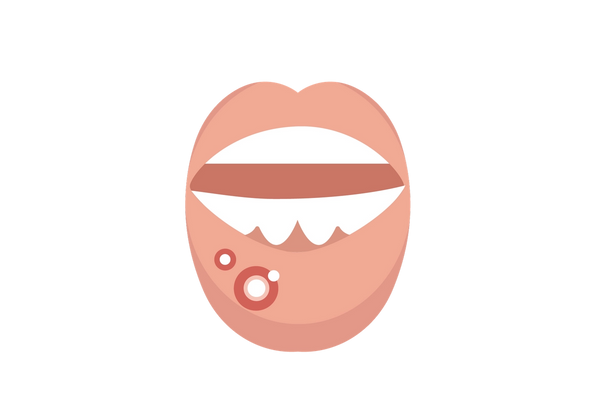Canker sores are small, painful, and very annoying. While they eventually go away on their own, you can speed up the healing process.
What is a canker sore?
Pro Tip
Patients typically describe experiencing small, shallow, tender, self limited ulcerations on the mucosa of the cheeks, gums, or sides of the tongue. —Dr. Mollie MacComack
A canker sore (also called an aphthous ulcer) is a small, painful ulcer (open sore) inside your mouth. It is round and shallow with a whitish-grey base and a red ring around them.
Canker sores are very common and often begin to appear in childhood and adolescence, according to a study in Quintessence International. They are less frequent as you age.
Canker sores usually go away on their own within 1 to 2 weeks. For severe sores, there are treatments that decrease pain and speed up healing.
Sometimes, severe or frequent canker sores may be caused by a medical condition or nutritional deficiency.
Most common symptoms
Canker sores can be painful and feel like a burning sensation. You may start to feel symptoms about 24 hours before the actual sore forms, according to a review in Dental Clinics of North America. They can hurt more when you eat.
The sores look small, usually round or oval-shaped, and shallow. They are white to grey with a very red ring around them.
Most canker sores are inside of the mouth. On the gums, inside of cheeks and lips, the bottom of the tongue, or the soft palate at the back of the mouth.
Canker sores are often confused with cold sores. Cold sores are caused by the herpes simplex virus. They tend to occur around the lips and outside of the mouth and have fluid inside them. They are also very contagious.
Pro Tip
Symptoms can be triggered by trauma such as biting a lip or toothbrush injury. Once present, they are often irritated by acidic foods. —Dr. MacCormack
Main symptoms
- Pain or burning inside the mouth
- Small circle with whitish-grey base and red border
Other symptoms you may have
There are more severe types of canker sores. But they are rare.
- Major aphthae: Larger than normal canker sores that may last up to 6 weeks. These can be extremely painful. If you frequently get them, this is called “complex aphthosis.”
- Herpetiform aphthae: Many small canker sores can combine into a larger group and look like a herpes virus sore. But they aren’t herpes.
What causes canker sores in the mouth?
The exact cause is unknown. It may be related to an overreaction by the immune system. But they are not caused by a virus or bacteria. And they are not contagious.
Many things can trigger canker sores:
- Stress or illness
- Hormonal changes such as during menstruation (period)
- Trauma to the mouth, from biting your cheek or recent dental work or braces.
- Eating acidic foods, like citrus fruits.
- Allergies to food or to ingredients in toothpaste such as sodium lauryl sulfate.
- A burn, bite or another injury to the inside of the mouth.
How do you heal a canker sore
Most canker sores heal in 1 to 2 weeks. But you can try home remedies or medications to help with pain or speed up healing.
If the sores are very painful, contact your doctor or dentist. Or go to urgent care.
Check with your doctor if a canker sore doesn’t get better after two weeks. Or if they are frequent or large. Your doctor may want to run some tests.
Canker sore treatments
These remedies may soothe pain and dry out the canker sore:
- Honey applied to the sore 2 to 4 times daily
- Gargling with salt or baking soda mixed with water can help dry out the sore, helping it heal. Though it may sting, too.
- Use an over-the-counter medication applied directly to the sore to soothe the pain and speed healing. Prescriptions are available if these don’t help.
- Antibacterial mouthwashes can also help. (Avoid mouthwash with alcohol.)
Ready to treat your canker sore?
We show you only the best treatments for your condition and symptoms—all vetted by our medical team. And when you’re not sure what’s wrong, Buoy can guide you in the right direction.See all treatment optionsWhat makes you more likely to have canker sores
Dr. Rx
Symptoms can be triggered by trauma such as biting a lip or toothbrush injury. Once present, they are often irritated by acidic foods. —Dr. MacComack
Canker sores have few known risk factors. They tend to be more common in women and they can run in families.
Occasionally, they are related to an autoimmune disease like Behcet’s disease, celiac disease, Crohn’s disease, ulcerative colitis, HIV, and lupus. It may also be caused by nutritional deficiencies (including B vitamins, vitamin C, vitamin D, zinc, and iron).
Prevention
- Good oral hygiene—regular brushing and flossing daily—can help prevent sores.
- Try to prevent minor oral traumas by using a soft toothbrush and waxed, tape-style dental floss
- Avoid known allergic triggers: You may need to change to a toothpaste that doesn't contain sodium lauryl sulfate and a non-alcohol containing mouthwash.
- Avoid foods that seem to set off or worsen symptoms.
- If your canker sores are caused by nutritional deficiencies, eat a healthy diet and take vitamins that your doctor recommends. If you do not have a documented nutritional allergy, B12 supplementation may be helpful.
Was this article helpful?
